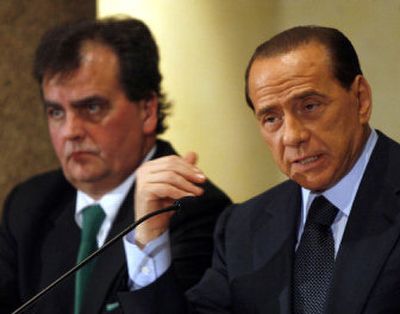9 deaths reported in cartoon protests

ROME – At least nine people were killed in clashes between protesters and Libyan police outside the Italian consulate in the Libyan city of Benghazi on Friday, according to reports from Libya and Rome. The violence came two days after an Italian politician boasted on television that he was wearing a T-shirt emblazoned with caricatures of Islam’s prophet Muhammad.
Video images showed demonstrators setting fire to an entrance to the consulate and to a car, and heaving stones at the whitewashed building. The Italian foreign ministry acknowledged in a diplomatic note that a demonstration had taken place and that it had been “energetically repressed” by police.
If confirmed, the death toll would be the highest in a series of protests around the world against the publication of the caricatures by Danish and other European media outlets.
On Wednesday, Italy’s Reforms Minister Roberto Calderoli said in an interview televised on the state-run RAI network that he was wearing the T-shirt and unbuttoned his shirt to give a glimpse of it. Word of the appearance spread quickly through the Middle East: At least two newspapers in Egypt and one in Saudi Arabia wrote about the incident, and Al-Jazeera, the satellite television network, broadcast the news.
Foreign Minister Gianfranco Fini said the act “poured oil on fire,” and Prime Minister Silvio Berlusconi asked Calderoli to resign.
Calderoli, who belongs to an anti-immigration faction in Berlusconi’s ruling coalition, was unapologetic. He said the display was a personal statement and not reflective of government policy.
The aftershocks of the cartoon controversy have persisted elsewhere in Europe, though lower in intensity than in the Middle East.
A week ago in Germany, Der Tagesspiegel newspaper published a cartoon that showed four Iranian soccer players dressed as suicide bombers standing alongside four nervous-looking members of the German team dressed in German army uniforms. The caption read: “Why the German army absolutely has to be deployed at the World Cup,” referring to the global soccer championship scheduled for play in Germany this summer. The editors say the purpose of the cartoon was to satirize the German government’s desire to dispatch soldiers to World Cup sites.
The Iranian government demanded an apology and, on Tuesday, protesters in Tehran threw firebombs at the German Embassy. The cartoonist, Klaus Stuttman, is in hiding because of death threats, according to German reports.